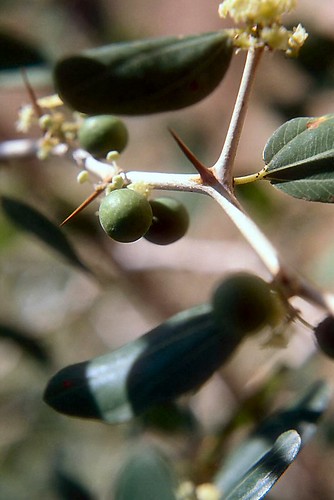Plant of the Month: July 2006
 Ziziphus spina-christi
Ziziphus spina-christi
Sidr, Arabian Jujube, Syrian Christ Thorn
There are few plants that transcend religious and cultural boundaries as ubiquitously as the Jujube. A native of Africa, it is widespread in the Middle East in areas like Iraq, Israel, and Yemen.
In the Bible it represents the thorns used to assemble the crude crown that topped Christ's head during the Passion. John 19:2 says "And the soldiers platted a crown of thorns, and put [it] on his head, and they put on him a purple robe," before displaying him bloodied and broken; Ecce Homo.
In the Quran it represents the trees shading eternal paradise. Sura 56 (The Inevitable) promises "those Foremost (in Faith) will be Foremost (in the Hereafter)... (They will be) on Thrones encrusted (with gold and precious stones)," and provided with their reward of virgins: "Companions with beautiful, big, and lustrous eyes,- Like unto Pearls well-guarded." All of this "among Lote-trees without thorns," a popular economic provider around the region where Islam had its genesis.
The fresh and dried fruit, Jujubes, are an important staple crop in the Arabic world and many pharmaceutical remedies were attributed to this trees constitute parts. A review by the Journal of Ethnobotany and Ethnomedicine summarizes the various uses. It is attributed to the Prophet Mohammed that honey made from the Lote Tree is superior and it is one of the major honey production plants in the region to this day. Many Iraqi Muslims wash newly dead bodies with Sidr leaves and the ritual is unique to the region and species. I'd be willing to bet Sidr stock is going to skyrocket on the Iraqi market very soon.
If that's not enough, Cat Stevens titled a song "Lote-Tree" on his album Life of the Last Prophet, released under his Muslim moniker Yusuf Islam. Cat Stevens could save the world, man.

No comments:
Post a Comment